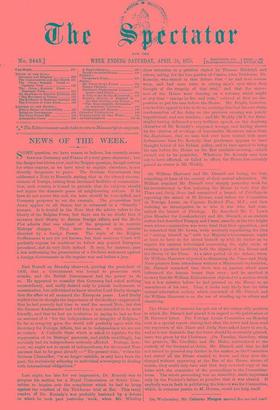Earl Russell on Monday observed, quoting the precedent of 1802,
that a Government was bound to prosecute such attacks, and the British Government had the power to do so. He appeared to consider that Germany had asked nothing extraordinary, and really desired only to punish incitements to assassination, but still wished to know whether Lord Derby thought that the affair at all menaced the European peace. Lord Derby replied that he thought the importance of the incident exaggerated, that he had scarcely had time to read the second Note, but that the German Ambassador had told him it was intended to be most friendly, and that he had no hesitation in saying he had no fear on account of it "for the independence or integrity of Belgium." So far as integrity goes, the world will probably agree with the Secretary for Foreign Affairs, but as to independence we are not so certain. A Catholic State which is asked to legislate for the suppression of its Bishops' pastorals, and yields unwillingly, has certainly had its independence seriously affected. Perhaps, how- ever, we ought not to speak of independence, for the second Note assumes that to be gone already :—" The present time," writes the German 'Chancellor, "is no longer suitable, as may have been the past, for exclusively adhering to individual sovereignty in dealing with international obligations."


































